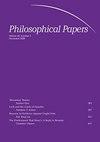自卫,没收和必要性
IF 1.3
3区 哲学
0 PHILOSOPHY
引用次数: 0
摘要
摘要本文的论点是,如果一个杀手剥夺了他的生命权,那么为什么一个应受谴责的侵略者会剥夺他不遭受防止其侵略所需伤害的权利。我认为,这种策略也解释了对自卫的必要性限制。我回应了一些反对意见,包括担心试图将相对没有争议的(侵略者的没收)与极具争议的(杀手的没收)进行推导是没有意义的。本文章由计算机程序翻译,如有差异,请以英文原文为准。
Self-Defense, Forfeiture, and Necessity
Abstract The thesis of this paper is that it is possible to explain why a culpable aggressor forfeits his right not to suffer the harm necessary to prevent his aggression if a killer forfeits his right to life. I argue that this strategy accounts also for the necessity restriction on self-defense. I respond to several objections, including the worry that it makes no sense to attempt a derivation of the relatively uncontroversial (aggressor’s forfeiture) from the highly controversial (killer’s forfeiture).
求助全文
通过发布文献求助,成功后即可免费获取论文全文。
去求助
来源期刊

Philosophical Papers
PHILOSOPHY-
CiteScore
2.10
自引率
0.00%
发文量
18
期刊介绍:
Philosophical Papers is an international, generalist journal of philosophy edited in South Africa Original Articles: Articles appearing in regular issues are original, high-quality, and stand-alone, and are written for the general professional philosopher. Submissions are welcome in any area of philosophy and undergo a process of peer review based on initial editor screening and refereeing by (usually) two referees. Special Issues: Topic-based special issues are comprised of both invited and submitted papers selected by guest editors. Recent special issues have included ''Philosophy''s Therapeutic Potential'' (2014, editor Dylan Futter); ''Aging and the Elderly'' (2012, editors Tom Martin and Samantha Vice); ''The Problem of the Criterion'' (2011, editor Mark Nelson); ''Retributive Emotions'' (2010, editor Lucy Allais); ‘Rape and its Meaning/s’ (2009, editor Louise du Toit). Calls for papers for upcoming special issues can be found here. Ideas for future special issues are welcome.
 求助内容:
求助内容: 应助结果提醒方式:
应助结果提醒方式:


